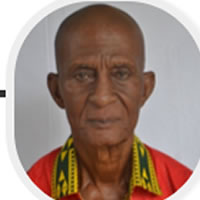The Health Management System
The Health Management Team (DHMT), to be headed by a District Director of Health Services, manages the District Health System. A similar structure, the Sub – District Management Team (SDMT), is responsible for the management of the hospital.
- General Health Conditions [including top-ten diseases, endemic and communicable diseases, maternal and child health mortality, nutrition, etc]Malaria continues to be the #1 cause of OPD attendance. During the year 22,486 cases representing almost 58% of all admissions were recorded. As much as malaria continues to dominate cases of admissions, we should make all efforts to limit the fatality due to malaria. Anaemia became the leading cause of death. Most of these deaths are children. The DHD would embark on deworming exercise in children to rid them of pathogenic worms. We would also embark on intensive health education of care givers on the importance of good nutrition.
Causes of Maternal Deaths
Some of the mothers were from neighboring districts e.g Tepa in the Ashanti region. Maternal death audits established respiratory failure, eclampsia, and septicemia 20 to ruptured uterus, hypoglycaemia and induced abortion as the most common causes.
Still Births
Still births are caused by a number of factors. In this instance the most common causes were found to be foetal distress, preterm, delayed 2nd stage, cord prolapse, asphyxia, congenital malformation and prolonged labour.
Child Health Services
Child health services comprise immunization, health education, growth monitoring and nutrition. These services were carried out in all the static clinics and outreach points.
Nutrition: Micronutrient Deficiency Control
IDD Program
Iodated salt survey was conducted twice during the year. It was established that 66% of households use iodated salt. The market survey revealed that 88% of the salt sold is iodated.
Even though mothers may be buying iodated salt from the market, these salts loose their iodine content on storage. We would therefore not only encourage people to eat iodated salt but also teach them how to store it to protect the iodine.
Iron Deficiency and Supplementary Feeding Program
The district has no malnutrition rehabilitation center. However food demonstration was done every two weeks in Bechem hospital. Mothers were taught how to prepare nutritious foods to prevent anaemia in their children. Preparation of foods using beans, vegetables, eggs, was stressed. A total of 68 mothers attended with their babies. Most of the participants were mothers with babies aged less than 5 years. The children of some of the participants were admitted in the hospital with different types of protein energy malnutrition. The table below shows the details of the protein energy related malnourished patients in the hospital.
Vitamin A Program
Mass Vitamin A supplementation was carried out in the district in May and November 2005. In addition to this routine and maternal vitamin A supplementation was also vigorously pursued. We would continue with the nutrition programs to improve upon maternal and child health. Community health nurses would be trained to give comprehensive nutritional advice to mothers during out reach clinics.
Access to Health Facilities [number and distribution of hospitals, health centers, health posts, etc]. Public Health Activities: These include immunization, health education and promotion, epidemic prevention and management, disease control, etc. immunization and other services are carried out at specific locations called outreach points.
Community-Based Planning and Services (CHPS)
Community Health Planning and Services has been identified as one of the strategies to increase geographical access to quality health care. In 2005 the DHD in conjunction with the District Assembly is constructed CHPS compound at Nsuta and Mawaninso in the Derma and Bechem sub districts respectively. The buildings have been roofed. Hopefully it would be functional by the end of 2006.
Two Community Health Nurses, currently under training at the Tanoso Community Health Nursing School, have been sponsored by the DHD and the TSDA. They would be deployed in the CHPS zones upon completion.
Exemptions
All public health facilities in the district continue to give exemptions to the poor, aged, indigents and pregnant women.
Free maternal delivery service was started in April 2005. This led to a significant increase in deliveries in our health facilities.
On-going programmes and Projects in the Health Sector
- Control of Communicable and non-communicable diseases including malaria, tuberculosis, malnutrition, worm control, etc
- Consolidation of the District Health Insurance Scheme
- Improving clinical care at the hospital and health centers
- Construction of Maternity and surgical wards at Bechem Gov’t Hospital
- Construction of CHPS compounds at Mawaninso and Nsuta Earmarked Projects
- Construction of CHPS compound at Subriso
- Construction of a Bungalow for the District Director of Health Services
- Construction of Kitchen facility at Bechem Hospital
- Continuous support of programs such as malaria, tuberculosis, clinical care, health insurance, etc
- Rehabilitation of Techimantia Health Center
- Rewiring of Derma Health Center
Date Created : 11/21/2017 1:31:02 AM






 facebook
facebook X (twitter)
X (twitter) Youtube
Youtube +233 593 831 280
+233 593 831 280 0800 430 430
0800 430 430 GPS: GE-231-4383
GPS: GE-231-4383 info@ghanadistricts.com
info@ghanadistricts.com Box GP1044, Accra, Ghana
Box GP1044, Accra, Ghana